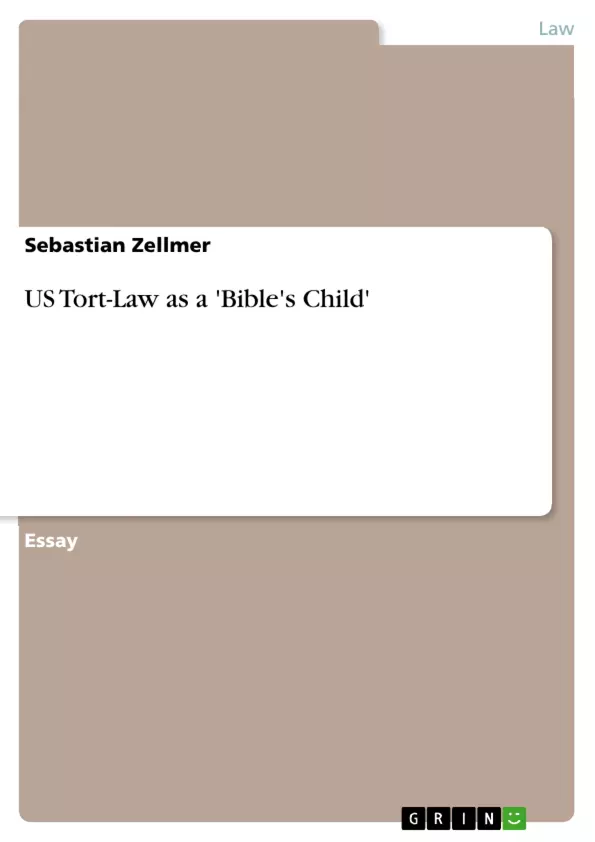A central idea of the Holy Bible is the concept of right and wrong. Following this idea a whole set of commandments and prohibitions, such as "...Thou shall not kill. Thou shall not commit adultery..." or "...that ye love another"1, are developed in this book establishing an unique moral system. As Christians are told about good and evil, defined in Bible′s rules and construed by Theologians, their believe comprises a complete legal system as well. As it is typical for legal systems the religious basic principles are not just meant as signposts on one′s way through life, but are enforced by the common practice of reward and punishment, too. God as the final individual′s judge is believed to decide all cases, if a person′s soul will be blessed with "life everlasting" or will be sentenced to be "cast into the lake of fire." Concerning its methods the Christian set of rules is therefore well comparable to other legal systems such as the US-Common Law. In its concrete content quite different of course, rewards as the guaranty of the Civil Rights and punishments as imprisonment are to be found here as a similar framework , too. Since the Christian believe undoubtedly has had a strong influence on modern western moral concepts, in the following part it will be examined, how strong the Bible′s impact on recent legal terms and the concept of modern US-law of intentional torts and product liability has been and if other influences must be recognised.
Inhaltsverzeichnis (Table of Contents)
- US-Tort Law as a "Bible's Child"
- Intentional Torts
- Battery
- False Imprisonment
Zielsetzung und Themenschwerpunkte (Objectives and Key Themes)
This essay examines the influence of the Bible on US tort law, specifically focusing on intentional torts and product liability. It explores how biblical principles of right and wrong, moral evaluation, and punishment have shaped legal concepts and practices in the United States.
- The impact of biblical principles on US tort law
- The concept of intentional torts and their connection to moral values
- The influence of the Bible on specific torts, including battery and false imprisonment
- The comparison of biblical and modern legal frameworks for addressing wrongdoing
- The role of individual responsibility and the consequences of actions in both biblical and legal contexts
Zusammenfassung der Kapitel (Chapter Summaries)
- US-Tort Law as a "Bible's Child": This section introduces the essay's central theme, exploring the idea that US tort law is influenced by biblical principles of right and wrong, punishment, and moral evaluation. It draws comparisons between the Bible's system of commandments and prohibitions and the legal framework of US tort law, emphasizing the similarities in their foundational principles.
- Intentional Torts: This section delves into the concept of intentional torts, defining them as wrongful acts or omissions that lead to liability. It highlights the strong influence of moral values on legal terms, emphasizing the expectation that individuals should foresee and avoid actions that harm others. The section further explores the connection between the Bible's "Neighbour principle" and the concept of intentional torts.
- Battery: This subsection examines the specific tort of battery, defined as the intentional application of physical force to another person. It analyzes the biblical story of David and Goliath as a potential example of battery, discussing the moral and legal implications of David's actions. The subsection also considers the defense of consent in the context of self-defense and the potential consequences of David's actions under modern US law.
- False Imprisonment: This subsection explores the tort of false imprisonment, defined as the unlawful confinement of a person against their will. It analyzes the story of Jesus' confinement by Roman troops as a potential example of false imprisonment, discussing the legality of the confinement under both Roman and modern US legal systems. The subsection also considers the role of individual consent and the potential for legal challenges based on missing reasons and procedural errors in the context of Jesus' confinement.
Schlüsselwörter (Keywords)
This essay explores the intersection of religious principles and legal frameworks, specifically focusing on the influence of the Bible on US tort law. Key themes include intentional torts, moral evaluation, individual responsibility, the "Neighbour principle", battery, false imprisonment, and the comparison of biblical and modern legal systems. The essay also examines specific legal concepts such as consent, self-defense, and the impact of legal proceedings on individual rights.
Frequently Asked Questions
How has the Bible influenced US tort law?
US tort law is influenced by biblical principles of right and wrong, individual responsibility, and the concept of reward and punishment for one's actions.
What is the "Neighbour principle" in legal terms?
Derived from the biblical command to "love thy neighbour," it reflects the legal expectation that individuals should avoid harming others through foreseeable wrongful acts.
How does the story of David and Goliath relate to Battery?
The essay analyzes David's actions as a potential case of battery (intentional physical force), while also considering the legal defense of consent and self-defense.
Can the confinement of Jesus be seen as False Imprisonment?
The text explores this possibility by examining the legality of his arrest under both Roman law and modern US legal standards regarding procedural errors.
Is US Common Law comparable to religious legal systems?
Yes, the essay argues that both systems use a framework of rules enforced by consequences (blessings/fire vs. civil rights/imprisonment) to regulate moral behavior.
- Citation du texte
- Sebastian Zellmer (Auteur), 2001, US Tort-Law as a 'Bible's Child', Munich, GRIN Verlag, https://www.grin.com/document/1798



